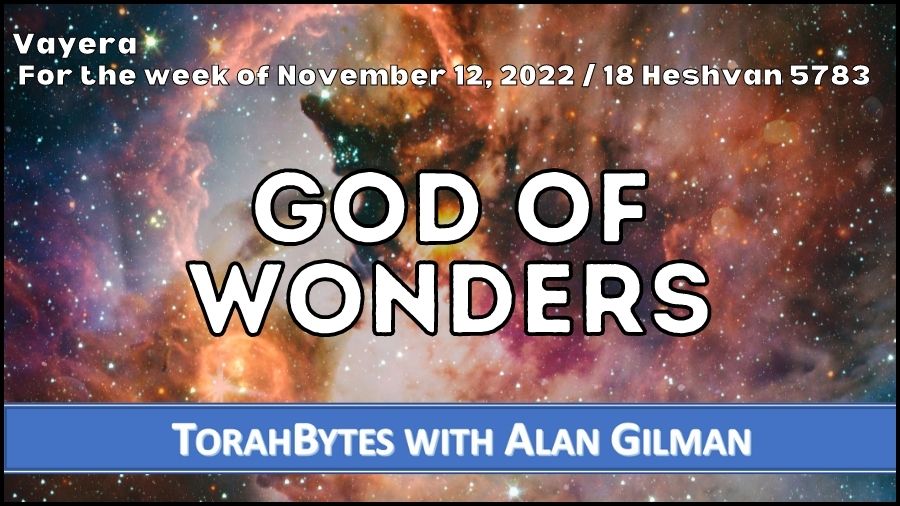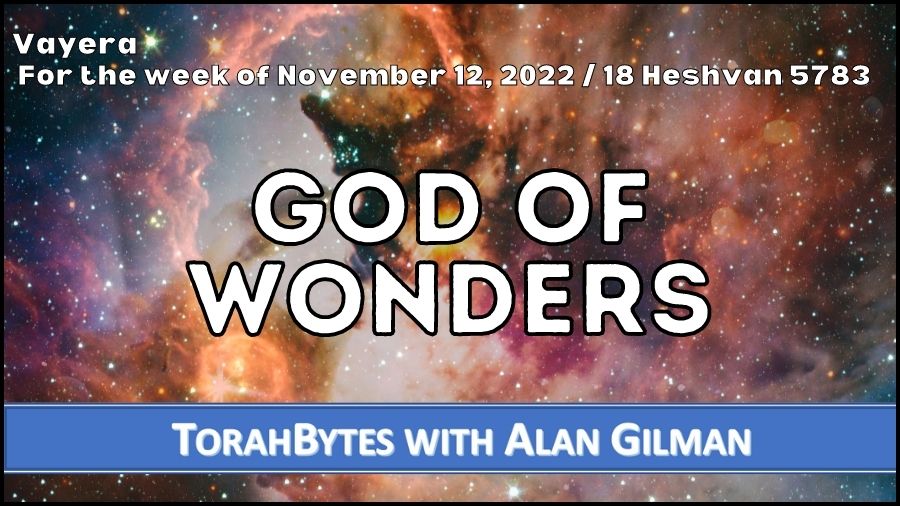
God of Wonders
For the week of November 12, 2022 / 18 Heshvan 5783

Vayera
Torah: Bereshit/Genesis 18:1 – 22:24
Haftarah:2 Kings 4:1-37
Download Audio [Right click link to download]
Is anything too hard for the LORD? (Bereshit/Genesis 18:14)
This week’s parsha (weekly Torah reading portion) includes God’s visit to Abraham and Sarah to announce her giving birth to a son in a year’s time. Sarah reacted by laughing in disbelief. This is understandable due to her awareness of being well past child-bearing age (see Bereshit/Genesis 18:11). Understandable or not, God questioned the validity of Sarah’s response on the basis of the rhetorical question (in the words of our translation), “Is anything too hard for the LORD? (Bereshit/Genesis 18:14).
The reference to “too hard” is derived from the Hebrew word pala. The vast majority of popular English translations represent this as “too hard” or “impossible.” But that fails to capture the extent of the contrast between God’s ability and Sarah’s assumption. The word pala is the word for “wonder” as in the wonders God performed in Egypt on behalf of the Israelites. It is also one of the designations of the coming king in Isaiah 9:6 (“And his name shall be called Wonderful Counselor”). In contexts where miraculous signs are not necessarily involved, it appears to be stressing the extraordinary nature of God and his works. Pala reflects that God’s works function beyond the limits of our understanding.
Translating “pala” as “too hard” or “impossible” misses the point. There is something more to this than simply God’s ability to do the extremely difficult. His ability is on a scale, not only more than, but very different from our own. He is not just bigger and stronger than everything, he functions within a realm outside of anything we can possibly conceive of.
Is this not Paul’s assertion when he writes, “Now to him who by his power working in us is able to do far beyond anything we can ask or imagine” (Ephesians 3:20; CJB). Think about that! Not just your imagination, but imagination in general. We might claim we believe that God’s ability is limitless, while at the same time, limiting him in our minds regardless. We do this by not truly accepting that his ability is beyond our understanding. That’s why Paul includes asking along with imagination. God’s wonders are beyond our ability to articulate them.
Often, when the subject of God’s infinite power comes up, many people want to know why he allows bad things to exist at all. While a lot of us wouldn’t admit this, this kind of question tend to carry an underlying suspicion towards God. Either God isn’t all powerful or he isn’t truly good. More personally, perhaps he cares more about others than me. I think it’s important to grapple with such questions. The answers, as far as I understand Scripture, are found in grasping the essence of God’s plans and purposes in the world. Human beings have been created to steward the planet under God’s rule. We are to do so as mature, responsible children of God the King. We are so crucial to God’s creation project that our actions matter. Our submission to God through faith and obedience produces blessing. Doing our own thing in our own way leads to destruction. God’s wielding his power to forcibly prevent human misuse of our divinely derived responsibility might sound appealing but that would be to create a completely different type of existence. We have no idea what such a world would be like. We are better off learning to navigate the world the way it actually is.
So, instead of wondering why God doesn’t perform according to our preferences, what would happen if we spent more time contemplating that he really is a God of wonders? What would happen if we trusted that the realm of his activities is truly beyond anything that we can imagine? Perhaps we would be so overwhelmed that we’d be dumbstruck. After all, his ability at work in us is beyond anything that we can put into words. But hold on. His wonder-working power is something that is active both in us personally and communally. If we let that sink in, how might we view our challenges, our problems, and our disappointments, not to mention how we might approach opportunities and dreams?
We don’t realize how we restrict God’s unlimited power in our lives by limiting what we believe he is able to do. By limiting him to the realm of our perceived possibilities we fail to keep in step with him. But once we reckon that he is a God of wonders, we can begin to live the wonder-filled lives he is calling us to.
Scriptures taken from the English Standard Version unless otherwise indicated.